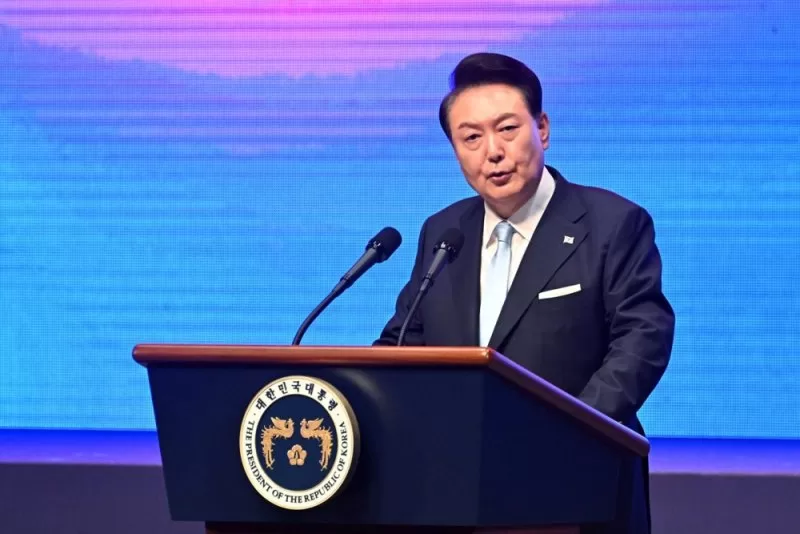South Korean President Yoon Suk Yeol outlined plans for unification with the North during the celebration of the 79th National Liberation Day at Sejong Center of the Performing Arts in Seoul on Thursday. The National Liberation Day marks South Korea’s independence from Japanese colonial rule following the end of World War II, after Japan surrendered in August 1945. Pool Photo by Kim Min-hee/EPA-EFE
SEOUL, Aug. 15 (UPI) — South Korean President Yoon Suk Yeol on Thursday outlined a vision for unification with North Korea and offered to open a working group for dialogue, even as tensions with Pyongyang remain precariously high.
Yoon laid out his plan in an address marking South Korea’s Liberation Day, which celebrates the 1945 end of Japan’s colonial rule, saying that “complete liberation remains an unfinished task for us.”
“The freedom we enjoy must be extended to the frozen kingdom of the North, where people are deprived of freedom and suffer from poverty and starvation,” Yoon said. “Only when a unified free and democratic nation rightfully owned by the people is established across the entire Korean Peninsula will we finally have complete liberation.”
Yoon’s blueprint for unification includes sparking change within North Korea through human rights improvements and access to information from the outside world.
“It is also important to help awaken the people of North Korea to the value of freedom,” Yoon said. “Testimonials from numerous North Korean defectors show that our radio and TV broadcasts helped make them aware of the false propaganda and instigations emanating from the North Korean regime.”
The South Korean president called for building international support for unification among allies and proposed establishing an “Inter-Korean Working Group” for dialogue with the North.
“This body could take up any issue ranging from relieving tensions to economic cooperation, people-to-people and cultural exchanges and disaster and climate-change responses,” Yoon said.
The plan comes at a time when prospects for unification appear to be at a nadir. In February, North Korean leader Kim Jong Un declared the South the “principal enemy” and publicly called for a constitutional change rejecting the long-held official goal of reunification.
The South Korean public has also lost enthusiasm for becoming one country with the North, especially younger generations. In one recent poll, more than 60% of respondents in their 20s and 30s said unification was unnecessary.
Analysts said that Seoul’s offer was unlikely to entice North Korea to the discussion table.
“The creation of an Inter-Korean North/South Working Group will surely fall on deaf ears in Pyongyang,” said Sean King, senior vice president and East Asia expert at New York-based consulting firm Park Strategies.
“Yoon’s clearly proposing unification by absorption, not a coming together of two equals,” King told UPI. “This speech was largely about rhetorical positioning on Yoon’s part — well intended but not feasible under current realities.”
Pyongyang has kept up a steady stream of weapons tests and hostile rhetoric over the past three years, while back-and-forth Cold War-style psychological warfare has emerged in border areas in recent months.
North Korea has sent thousands of balloons carrying scrap paper, shredded clothing and manure into the South since early June, including one that spilled trash on Yoon’s presidential compound. Seoul, meanwhile, has resumed propaganda loudspeaker broadcasts near the DMZ, blasting K-pop songs and South Korean news and information across the border.
Earlier this week, North Korean state-run media decried the growing trilateral security relationship among the United States, South Korea and Japan, warning that the Asian allies would become “cannon fodder” for a nuclear attack.

